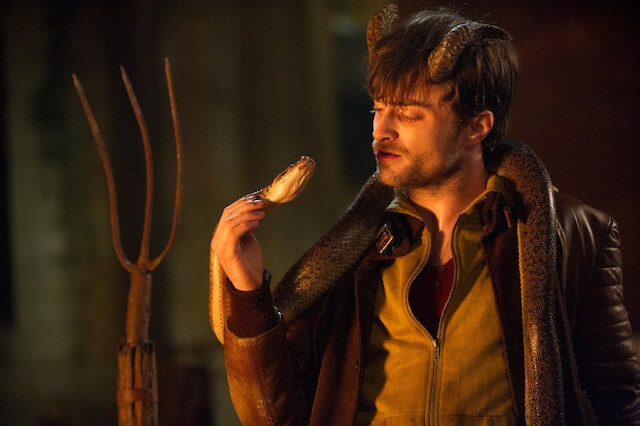‘Horns’
Director: Alexandre Aja
Stars: Daniel Radcliffe, Juno Temple
Rating: R
2 (out of 5) Globes
Review: Daniel Radcliffe tries hard to buoy the overstuffed ‘Horns’

RADiUS-TWC
There’s a lot of trying in “Horns.” It’s a horror-mystery-comedy-romance-drama that’s also a grief film and a bit of a religious one as well (albeit the kind with a guy’s head shotgunned like a watermelon and a Bowie-backed sex scene). On top of that, two of its leads are playing against type. Daniel Radcliffe tries a new type: an intense, brooding, sarcastic DJ, driven mad by being (probably wrongfully) blamed for his girlfriend’s murder. She’s played (in flashback) by Juno Temple, usually an in-your-face free-spirit, but here a meek, nice church girl (who still gets naked). On top of that, director Alexandra Aja — the Frenchman of extreme gore fests like “High Tension” and “Piranha” — is trying to juggle about five genres heretofore alien to him. And on top of that, it’s based on a sprawling novel (by Joe Hill, son of Stephen King), which — even at just over two hours — it gorily had to gut.
There’s so much to do — and also tons of supporting players, including a sleep-and-you-miss-her Heather Graham — that it’s almost understandable when it can’t get around to making its central gimmick make even a mysterious kind of sense. Hounded by his “Twilight”-y Pacific Northwest town, who think him a murderer, Radcliffe’s Ig awakes from one of his blackout drunk nights to find a pair of horns protruding from his forehead. Why? It might have something to do with his dead boo Merrin’s Christian faith, maybe? Thing is, not everyone can see it. Those who can tend to be hiding something, and when in his company lapse into babbling confessions. Some are relatively banal: There’s the loose bartender who secretly thinks she’s pathetic. Some are decidedly less so: Ig’s allegedly supportive parents (Kathleen Quinlan and James Remar) suddenly admit they think him a killer and wish him dead.
Meanwhile, in the midst of this whodunit and “Shallow Hal”-style business, there are giant hunks of not always important backstory to flashback to: how young Ig and Merrin fell in love as children; how Ig almost died in a dumb childhood stunt; how Merrin abruptly and inexplicably broke up with him. “Horns” is not afraid to stop the pace dead and get lost in digressions and backstory. In that sense it’s quasi-novelistic. But the novel never had to put up with cheesy f/x. Radcliffe’s horns look good, especially once they’re fully grown; less so some of the other, also not well set up things, like creepy, apparently supernatural snakes that start slithering around for some reason, helping Ig on his quest to punish those who’ve wronged him.
There’s so much going on that some of its actually interesting ideas get lost in the thicket. Ig has a temper, and isn’t exactly a pleasant person; he’s vindictive and single-minded. He imagined a future where his childhood sweetheart and he would stay in their home town and grow old together. (This is apparently changed from Hill’s novel, where the plan was to decamp for some big, bad city.) When Merrin takes this away from him, he loses it; when she dies and he’s pegged as who done it, he really loses it. Radcliffe is incredibly committed to the role; he’s short in stature, but he has the intensity of a giant. We’re meant to think that, once he finds the real killer, he might finally turn psychotic — that being wrongfully accused reveals the monster underneath, as it did to Humphrey Bogart’s screenwriter in Nicholas Ray’s “In a Lonely Place.” But this arc gets buried in the film’s underexplained gimmicks, its fat flashbacks, its tonal shifts, its broad jokes and a thumb-twiddling finale that at least lets its director indulge in his hard-R shenanigans. At heart it’s a disturbing character study of someone who can’t handle losing what he assumed was his future. Good luck finding it.
Follow Matt Prigge on Twitter @mattprigge


















